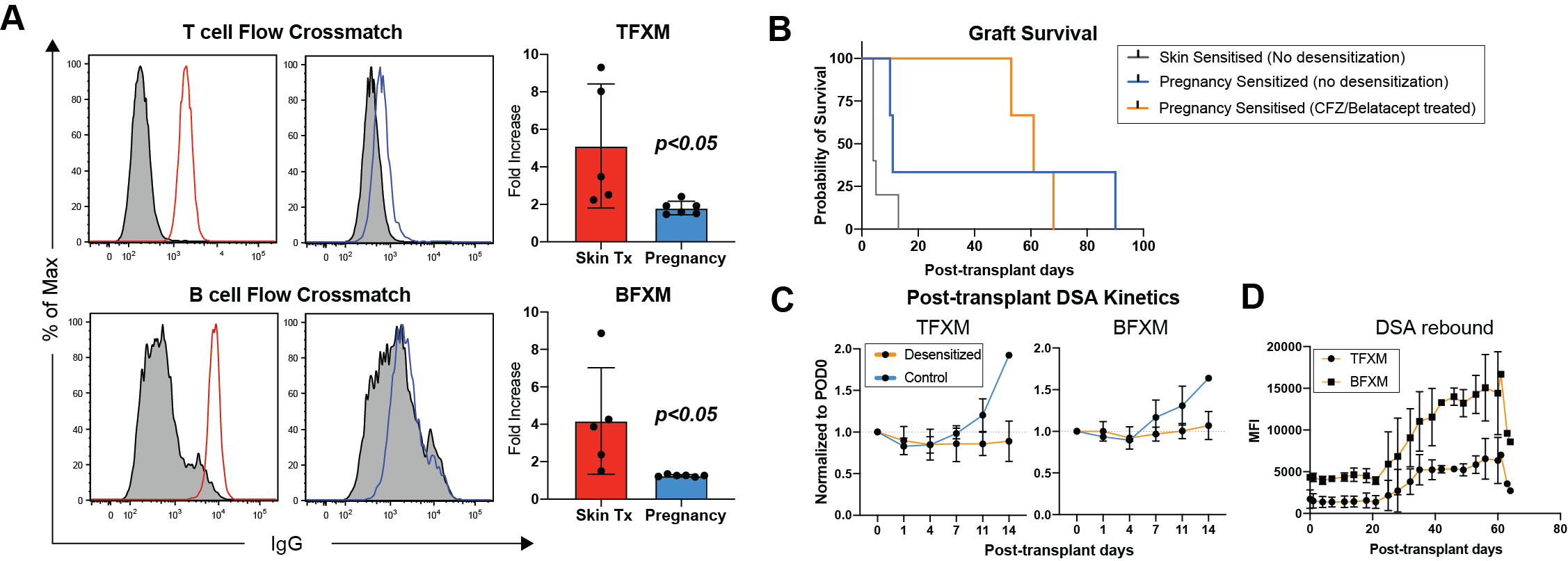Natural Sensitization by Pregnancy, Testing Desensitization Strategies in Female NHPs Across Repeat Mismatches
Duke Transplant Center, Duke University Medical Center, Durham, NC
Meeting: 2021 American Transplant Congress
Abstract number: 342
Keywords: Alloantibodies, Preclinical trails, Pregnancy, Sensitization
Session Information
Session Name: Xenotranplantation and Preclinical Studies
Session Type: Rapid Fire Oral Abstract
Date: Tuesday, June 8, 2021
Session Time: 6:00pm-7:00pm
 Presentation Time: 6:00pm-6:05pm
Presentation Time: 6:00pm-6:05pm
Location: Virtual
*Purpose: Women are disproportionately represented in the highly sensitized patient cohort, and HLA-incompatible transplantation is undertaken predominantly in females. However, nonhuman primate (NHP) models to date have relied on juvenile male animals. Therefore, we sought to examine the dual desensitization strategy using costimulation blockade and proteasome inhibition on naturally sensitized NHPs using multiparous female monkeys.
*Methods: 6 multiparous animals were included in the study, 3 as controls, and 3 receiving desensitization. Donors were allocated following screening to ensure greatest flow crossmatch positivity, evidence of repeated mismatch based on offspring MAMU typing and maximal MAMU mismatching. Treated animals received desensitization with weekly carfilzomib (CFZ, 27mg/m2) and belatacept (20mg/kg) for 4 weeks prior to kidney transplantation, followed by induction with rhesus ATG (RhATG), and maintenance with tacrolimus, mycophenolate mofetil and steroid. Comparison was made with skin sensitized control animals who did not receive desensitization n=5).
*Results: Multiparous monkeys had a mean of 843±90.8 days between the last sensitizing event (pregnancy) and kidney transplantation. Compared to skin sensitized animals, naturally sensitized multiparous monkeys showed significantly lower donor-specific antibody (DSA) level on the day of kidney transplant (Fig 1A). In accordance with this, multiparous female controls demonstrate heterogeneously prolonged survival, relative to animals sensitized directly to their donor by skin sensitization (Fig 1B). However, multiparous controls demonstrated early onset of DSA rebound compared to multiparous animals treated with carfilzomib and belatacept desensitization (Fig 1C). Desensitized multiparous animals showed better control of early post-transplant DSA, but DSA was significantly increased at post-operative day (POD) 42 compared to POD0 (BFXM MFI 13290 ±14 vs. 4477 ± 300, p = 0.016) (Fig 1D).
*Conclusions: Real life pregnancy-induced MAMU sensitization results in rapid rise of DSA post-transplant, and reduced transplant survival suggesting an intact memory B cell compartment. Desensitization with CFZ and Belatacept prolongs survival, although control of post-transplant humoral response fails after 6 weeks on conventional triple immunosuppressive therapy.
To cite this abstract in AMA style:
Manook M, Yoon J, Fitch Z, Schmitz R, Jackson AM, Kwun J, Knechtle S. Natural Sensitization by Pregnancy, Testing Desensitization Strategies in Female NHPs Across Repeat Mismatches [abstract]. Am J Transplant. 2021; 21 (suppl 3). https://atcmeetingabstracts.com/abstract/natural-sensitization-by-pregnancy-testing-desensitization-strategies-in-female-nhps-across-repeat-mismatches/. Accessed March 4, 2026.« Back to 2021 American Transplant Congress

